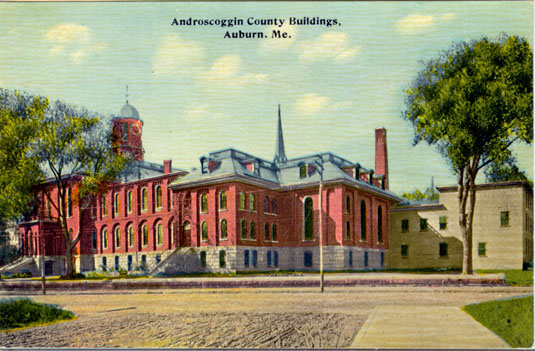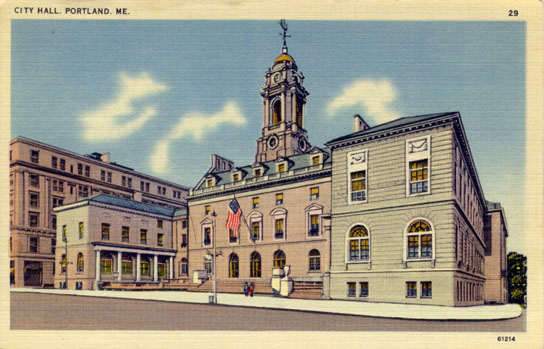In a democratic country like ours, the ability of the people to govern themselves is best displayed in the smaller divisions of government, the state the county, the city or town. Maine has these divisions and in addition the plantation.
Counties. The county is the intermediate organization between the state government and the cities and towns. The boundaries of a county are determined by law, and every portion of the state is in some county. A town or city is chosen as the shire town or county seat, and here are erected the buildings necessary for the conduct of county business, the court house and the jail. The administrative functions are exercised by the county commissioners, three in number, who are elected for a term of six years. These commissioners make assessments, levy taxes, have charge of the county roads, and supervise the receipts and expenditures of county money. The clerk of courts is also the clerk of this body. The sheriff, who is elected for two years, is charged with the enforcement of the laws, has charge of the jail and appoints deputies in the larger towns. The county treasurer has charge of the money which comes, not from individuals, but from towns and from the fees and fines received by the sheriff and the clerk of courts. The office of the register of deeds is an important one. Here are kept the records of deeds, mortages and attachments. The county is the intermediate organization between the state government and the cities and towns. The boundaries of a county are determined by law, and every portion of the state is in some county. A town or city is chosen as the shire town or county seat, and here are erected the buildings necessary for the conduct of county business, the court house and the jail. The administrative functions are exercised by the county commissioners, three in number, who are elected for a term of six years. These commissioners make assessments, levy taxes, have charge of the county roads, and supervise the receipts and expenditures of county money. The clerk of courts is also the clerk of this body. The sheriff, who is elected for two years, is charged with the enforcement of the laws, has charge of the jail and appoints deputies in the larger towns. The county treasurer has charge of the money which comes, not from individuals, but from towns and from the fees and fines received by the sheriff and the clerk of courts. The office of the register of deeds is an important one. Here are kept the records of deeds, mortages and attachments.
- Androscoggin County Courthouse, 2 Turner Street, Auburn, ME 04210.
- Aroostook County Courthouse (Northern District), Court Street, PO Box 787, Houlton, ME 04730.
- Cumberland County Courthouse, 142 Federal Street, Portland, ME 04101.
- Franklin County Courthouse, Main Street, Farmington, ME 04938.
- Hancock County Courthouse, 60 State Street, Ellsworth, ME 04605.
- Kennebec County Courthouse, 95 State Street, Augusta, ME 04330.
- Knox County Courthouse, 62 Union Street, Rockland, ME 04841.
- Lincoln County Courthouse, High Street, Wiscasset, ME 04578.
- Oxford County Courthouse, 26 Western Avenue, PO Box 179, South Paris, ME 04281.
- Penobscot County Courthouse, 97 Hammond Street, Bangor, ME 04401.
- Pisctaquis County Courthouse, 51 East Main Street, Dover-Foxcroft, ME 04426.
- Sagadahoc County Courthouse, (752 High Street - location); PO Box 246 (mailing address), Bath, ME 04530.
- Somerset County Courthouse, Court Street, Skowhegan, ME 04976.
- Waldo County Courthouse, 73 Church Street, Belfast, ME 04915.
- Washington County Courthouse, Court Street, PO Box 297, Machias, ME 04654.
- York County Courthouse, 1 Court Street, Alfred, ME 04002.
| |
Cities. In Maine the law does not require a minimum population before a town can be incorporated as a city, and consequently, the fact that a place is a city does not indicate its size. Cities are incorporated under special charters with usually a mayor as chief executive, with a board of aldermen and common council. Cities are divided into districts called wards and each citizen must vote in his own ward. The government is representative and minor officials are chosen by the city council. One city in Maine has the commission plan of government. Each member of the commission is in charge of one of the departments, such as police, public works and so on. Together they for m a board which makes ordinances and carries on the business of the city. Another city is under the commission manager plan. The government is in the hands of one man, who is an expert, selected for his abilities in this line. In Maine the law does not require a minimum population before a town can be incorporated as a city, and consequently, the fact that a place is a city does not indicate its size. Cities are incorporated under special charters with usually a mayor as chief executive, with a board of aldermen and common council. Cities are divided into districts called wards and each citizen must vote in his own ward. The government is representative and minor officials are chosen by the city council. One city in Maine has the commission plan of government. Each member of the commission is in charge of one of the departments, such as police, public works and so on. Together they for m a board which makes ordinances and carries on the business of the city. Another city is under the commission manager plan. The government is in the hands of one man, who is an expert, selected for his abilities in this line. |
![Early Views of Portland, City Hall, Old Town Hall, and Old Court House [1908]](http://www.usgwarchives.net/me/cumberland/postcards/views.jpg) Towns. The towns are all incorporated under uniform state laws for the town form of organization. The town meeting, at which all citizens with a voting residence have a voice, is the legislative body and is an example of the purest form of democratic government. At the town meeting are chosen the officers of the town, money is raised and appropriated for town business. The chief officials are the selectmen, whose number may be from three, five or seven, the town clerk, treasurer, collector of taxes, the road commissioner, school committee, superintendent of schools, who serves several towns, and the board of health. Towns. The towns are all incorporated under uniform state laws for the town form of organization. The town meeting, at which all citizens with a voting residence have a voice, is the legislative body and is an example of the purest form of democratic government. At the town meeting are chosen the officers of the town, money is raised and appropriated for town business. The chief officials are the selectmen, whose number may be from three, five or seven, the town clerk, treasurer, collector of taxes, the road commissioner, school committee, superintendent of schools, who serves several towns, and the board of health.
Plantations. The plantation is a rudimentary town and has all the essential machinery that towns possess, but in a simplified form. Plantations may be organized for school purposes alone. The officials are the same as for towns except that three assessors that the place of selectmen.
Unorganized Townships. There is in Maine in addition to cities, towns and plantations another local unit called an unorganized township, which is sometimes confused in the popular mind with the plantation. It is however, entirely distinct as the name suggests is without a local form of government and consequently with no local officials and no local taxation. Many of these townships have a population of considerable size and have schools and roads. The schools come under the direct supervision of the State Department of Education while the roads are under the direction of the county commissioners. The unorganized townships occupy about one-half of the area of the state, or to be more exact forty-seven per cent.
|
Source(s) for narrative on this page: The Maine Book, by Henry E. Dunnack, Librarian of Maine State Library. Augusta, Maine 1920. pages 70-71. County Courthouse Book 2nd Edition by Elizabeth Petty Bentley Copyright 1995, Genealogical Publishing Co., Inc. page(s) 120 - 123.
[an error occurred while processing this directive]
[an error occurred while processing this directive]
| |